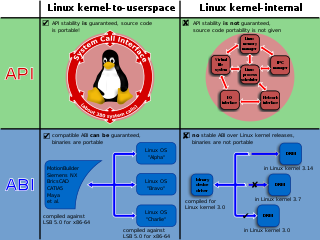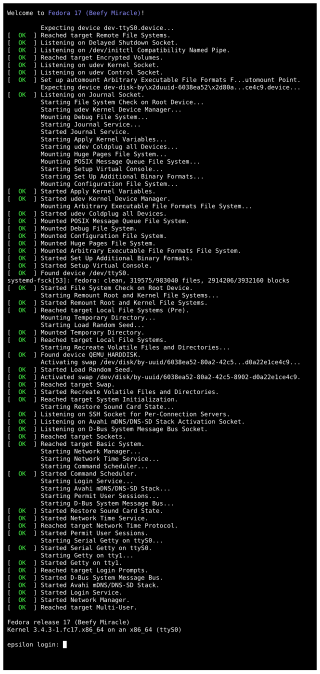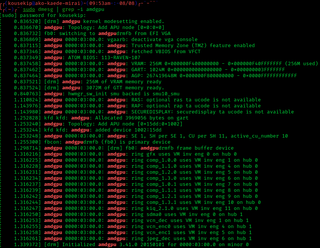The GNU C Library, commonly known as glibc, is the GNU Project implementation of the C standard library. It provides a wrapper around the system calls of the Linux kernel and other kernels for application use. Despite its name, it now also directly supports C++. It was started in the 1980s by the Free Software Foundation (FSF) for the GNU operating system.

ReactOS is a free and open-source operating system for i586/amd64 personal computers intended to be binary-compatible with computer programs and device drivers developed for Windows Server 2003 and later versions of Microsoft Windows. ReactOS has been noted as a potential open-source drop-in replacement for Windows and for its information on undocumented Windows APIs.
freedesktop.org (fd.o), formerly X Desktop Group (XDG), is a project to work on interoperability and shared base technology for free-software desktop environments for the X Window System (X11) and Wayland on Linux and other Unix-like operating systems. Although freedesktop.org produces specifications for interoperability, it is not a formal standards body.

μClinux is a variation of the Linux kernel, previously maintained as a fork, that targets microcontrollers without a memory management unit (MMU). It was integrated into the mainline kernel as of 2.5.46; the project continues to develop patches and tools for microcontrollers. The homepage lists Linux kernel releases for 2.0, 2.4 and 2.6.
In software engineering, a compatibility layer is an interface that allows binaries for a legacy or foreign system to run on a host system. This translates system calls for the foreign system into native system calls for the host system. With some libraries for the foreign system, this will often be sufficient to run foreign binaries on the host system. A hardware compatibility layer consists of tools that allow hardware emulation.
D-Bus is a message-oriented middleware mechanism that allows communication between multiple processes running concurrently on the same machine. D-Bus was developed as part of the freedesktop.org project, initiated by GNOME developer Havoc Pennington to standardize services provided by Linux desktop environments such as GNOME and KDE.

The Linux kernel provides multiple interfaces to user-space and kernel-mode code that are used for varying purposes and that have varying properties by design. There are two types of application programming interface (API) in the Linux kernel:
- the "kernel–user space" API; and
- the "kernel internal" API.
seccomp is a computer security facility in the Linux kernel. seccomp allows a process to make a one-way transition into a "secure" state where it cannot make any system calls except exit , sigreturn , read and write to already-open file descriptors. Should it attempt any other system calls, the kernel will either just log the event or terminate the process with SIGKILL or SIGSYS. In this sense, it does not virtualize the system's resources but isolates the process from them entirely.

NetworkManager is a daemon that sits on top of libudev and other Linux kernel interfaces and provides a high-level interface for the configuration of the network interfaces.

PulseAudio is a network-capable sound server program distributed via the freedesktop.org project. It runs mainly on Linux, including Windows Subsystem for Linux on Microsoft Windows and Termux on Android; various BSD distributions such as FreeBSD, OpenBSD, and macOS; as well as Illumos distributions and the Solaris operating system. It serves as a middleware in between applications and hardware and handles raw PCM audio streams.
HAL is a software subsystem for UNIX-like operating systems providing hardware abstraction.
Video Decode and Presentation API for Unix (VDPAU) is a royalty-free application programming interface (API) as well as its implementation as free and open-source library distributed under the MIT License. VDPAU is also supported by Nvidia.
oFono is a free software project for mobile telephony (GSM/UMTS) applications. It is built on 3GPP standards and uses a high-level D-Bus API for use by telephony applications. oFono is free software released under the terms of the GNU General Public License v2.
In computing, SPICE is a remote-display system built for virtual environments which allows users to view a computing "desktop" environment – not only on its computer-server machine, but also from anywhere on the Internet – using a wide variety of machine architectures.

systemd is a software suite that provides an array of system components for Linux operating systems. The main aim is to unify service configuration and behavior across Linux distributions. Its primary component is a "system and service manager" — an init system used to bootstrap user space and manage user processes. It also provides replacements for various daemons and utilities, including device management, login management, network connection management, and event logging. The name systemd adheres to the Unix convention of naming daemons by appending the letter d. It also plays on the term "System D", which refers to a person's ability to adapt quickly and improvise to solve problems.

Kmscon is a virtual console that runs in userspace which David Hermann created to replace the Linux console, a terminal built into the Linux kernel. Kmscon uses the KMS driver for its output, it is multiseat-capable, and supports internationalized keyboard input and UTF-8 terminal output. The input support is implemented using X keyboard extension (XKB). Development of Kmscon stopped in March 2015. There was a successor project called systemd-consoled, but this project was also later dropped in July 2015.

Flatpak is a utility for software deployment and package management for Linux. It provides a sandbox environment in which users can run application software in (partial) isolation from the rest of the system. Flatpak was known as xdg-app until 2016.

Zephyr is a small real-time operating system (RTOS) for connected, resource-constrained and embedded devices supporting multiple architectures and released under the Apache License 2.0. Zephyr includes a kernel, and all components and libraries, device drivers, protocol stacks, file systems, and firmware updates, needed to develop full application software.

AMDgpu is an open source device driver for the Linux operating system developed by AMD to support its Radeon lineup of graphics cards (GPUs). It was announced in 2014 as the successor to the previous radeon device driver as part of AMD's new "unified" driver strategy, and was released on April 20, 2015.










